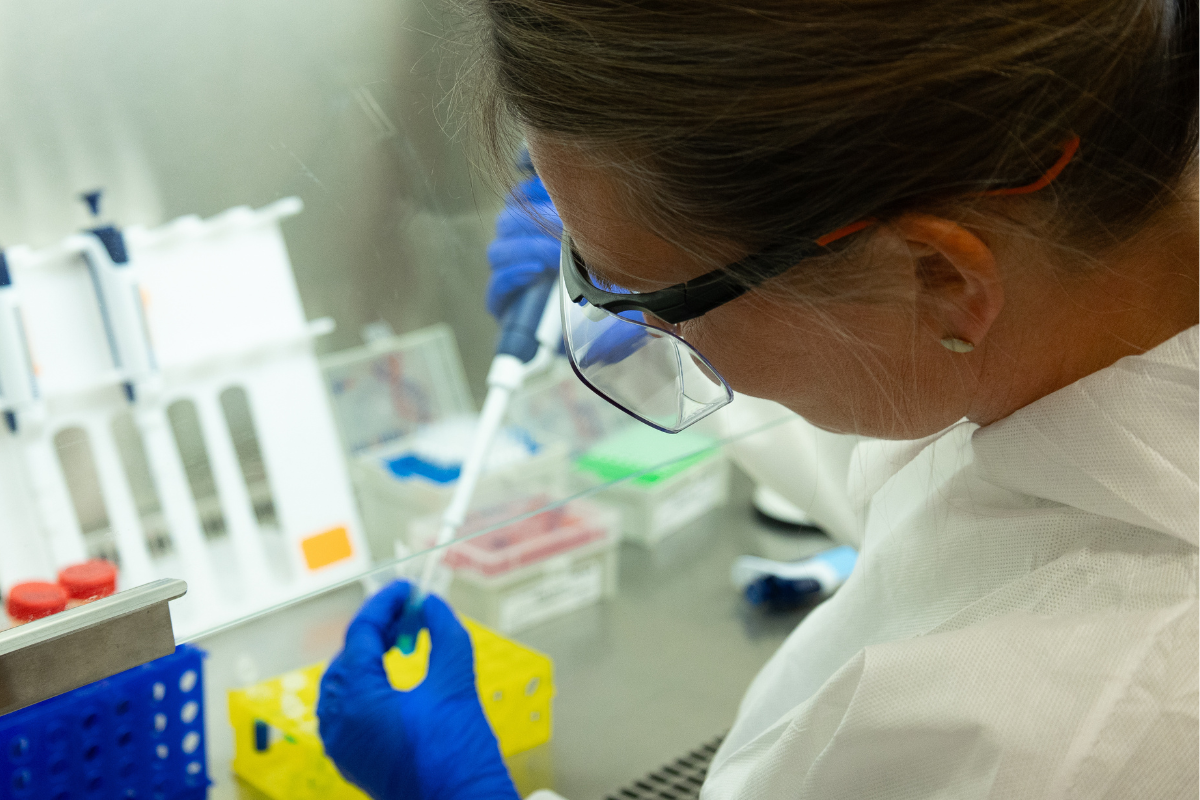DARO Systems Aims to Prevent Swine Disease Outbreaks Through Whole-Herd, Multi-Pathogen Surveillance
- published: 2024/08/07
- contact: NBDC Communications - Nebraska Business Development Center
- phone: 402.554.6256
- email: kjefferson@unomaha.edu

Omaha – Agtech startup DARO Systems LLC is taking a method proven to detect pathogens across populations during the COVID-19 pandemic and applying it to the swine production industry, with the ultimate goal of eliminating the threat of outbreaks that can devastate herds and cost billions in lost livestock.
Kristen Bernhard is the founder and CEO of DARO Systems. Bernhard has a master’s degree in Ecology and Evolutionary Biology from Iowa State University, where she managed an Evolution and Population Genetics Laboratory while conducting host-parasite phylogenetic studies. Most recently, she served as operations manager of the Pathogens Genomics laboratory at the University of Nebraska Medical Center (UNMC) Department of Environmental, Agricultural and Occupational Health, College of Public Health.
Bernhard has worked with teams on a wide array of disease surveillance programs globally, including Sars-Co-V2 wastewater surveillance and conducting measles surveys in the Congo.
She says the UNMC lab was among the first to pilot wastewater surveillance that later became prominent during the COVID pandemic. “It is a valuable way to detect pathogens because viruses move through populations,” she says. “The data is accurate and can be obtained well in advance of individual clinic data.”
The value of wastewater surveillance is proven, Bernhard says. “This is a system that needs to be put out to all communities, including animal production,” she says.
The production of pigs in the United States has a significant impact on the economy. According to the National Pork Producers Council, in 2023, more than 60,000 U.S. pork producers marketed more than 149 million hogs valued at $27 billion in gross cash receipts. The Nebraska Department of Agriculture says there are more than 3.8 million pigs in the state.
This is a system that needs to be put out to all communities, including animal production.
Disease mitigation is a top priority, Bernhard says. In addition to known swine diseases in the U.S., other emerging diseases such as African swine fever pose a significant threat to the pig population. According to the U.S. Department of Agriculture (USDA), African swine fever is a contagious and deadly viral swine disease affecting domestic and feral swine of all ages.
“Although it is not a direct threat to human health, its deadly nature in swine could result in pork product shortages, disruptions to trade and economic impacts,” the USDA says. “[Although] it has never been found in the United States . . . it has recently been found in countries close to the U.S., including the nearby Caribbean islands of Haiti and the Dominican Republic, which increases the threat of an African swine fever outbreak here.”
Bernhard says that because there is no treatment or vaccine for African swine fever, the best way to protect pigs is by prevention. That is the goal of DARO Systems, she says, and its mission, “bettering systems for bettering lives.”
DARO Systems currently has a provisional patent for a full-barn collection system that will give producers the advantage of obtaining reliable pathogen information across their entire herd rather that a small sampling of individual pigs, Bernhard says. Through a subscription system, producers will conduct the collection on a weekly or bi-weekly basis and send it to the DARO Systems lab, currently situated at the Biotech Connector on the Nebraska Innovation Campus in Lincoln.
In addition to her multidisciplinary advisory team, Bernhard has worked with Josh Nichol-Caddy, director of the Innovation and Technology program at the Nebraska Business Development Center (NBDC), and Quentin Farley, NBDC APEX Accelerator consultant, to obtain guidance regarding Small Business Innovation Research (SBIR) grants and other government funding opportunities.
Bernhard founded her company in 2023 and chose the name DARO in homage to the ancient city Mohenjo Daro in Sindh, Pakistan. The largest settlement of the ancient Indus Valley Civilization, Bernhard says archaeologists believe Mohenjo Daro was the site of the world’s first urban wastewater sanitation system.
“The name,” she says, “is both a tribute and the responsibility of our mission, ‘bettering systems for bettering lives.’”